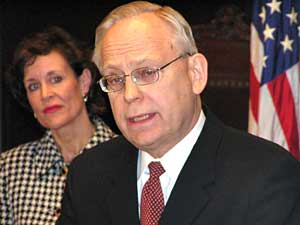|
Audio
Photos
More from MPR
Resources
|
St. Paul, Minn. — Minnesota's next chief justice won't have to move very far down the bench to take his new job. Russell Anderson has served as an associate justice on the court since 1998, when Republican Gov. Arne Carlson appointed him.
Prior to his appointment, Anderson served 16 years as a trial court judge in Crookston. He was first appointed to the bench by Republican Gov. Al Quie.
Anderson was obviously moved by the appointment, and choked up when asked if he ever thought he'd be chief justice of the court.
"I think life brings us to days and circumstances that we could never anticipate or know. I would never have thought that I would be standing here as the chief justice," Anderson said.
Anderson, 63, will become the administrative head of the judicial branch and will supervise the work of all of Minnesota's courts.
Prior to being a judge, Anderson was the Beltrami County Attorney, a private practice attorney and a staff attorney in the U.S. Navy's Judge Advocate General Corps.
Lorie Gildea, 44, will take Anderson's seat on the bench. Pawlenty appointed her to the court just three months after he named her a district court judge in Hennepin County. She has also served on the Minnesota Sentencing Guidelines Commission.
Gildea will be one of two women currently serving on the state's high court. The other is Justice Helen Meyer, who was appointed to the court in 2002.
|
I think life brings us to days and circumstances that we could never anticipate or know. I would never have thought that I would be standing here as the chief justice.
- New Chief Justice Russell Anderson
|
"It's important that a diverse group of folks sit on the Minnesota Supreme Court," said Gildea. "And it's important that the Minnesota Supreme Court look like Minnesota and represent Minnesota, and I'm just so excited to have the opportunity to serve on this court."
Gov. Pawlenty says he took Gildea's gender into consideration when he selected her. She is Pawlenty's second Supreme Court appointee. He appointed Barry Anderson to the court in 2004.
Pawlenty said making judicial appointments is one of the most important jobs a governor faces.
"We want and need people in these positions that are fair and balanced, and have a life perspective that is appropriate and measured, and that they are possessing the requisite skills and abilities," said Pawlenty. "We also look for those intangible characteristics that reflect, hopefully, common sense and good judgment beyond what is even on the paper."
Justice Anderson says he'd like to continue Kathleen Blatz's efforts in changing the state's child protection system. He also wants to make the courts more efficient.
Since 1944, every chief justice has had prior experience on the Supreme Court before filling the top job. Anderson becomes the ninth chief in that span.
Anderson has kept a lower profile than other sitting justices. His background intersects less with politics than some of his peers.
Blatz, for instance, was a Republican legislator before becoming a judge, and Justices Paul Anderson and G. Barry Anderson previously were active in Republican politics.
Some notable majority opinions by Anderson dealt with the constitutional expectation of personal privacy, including a couple that curbed the power of police to search vehicles without reasonable suspicion of a crime.
Anderson's appointment received praise from past and present colleagues. Blatz said he is a judge of the highest standing.
Former Supreme Court Justice Ed Stringer, who served with Anderson on the high court, says he's not surprised that Anderson was elevated to chief justice. Stringer says Anderson is highly respected by his colleagues.
"He came from the northwest part of the state, and he takes great pride in describing himself as a country judge," said Stringer. "Justice Anderson is a very measured individual, and has the epitome of judicial temperament. I can't say enough good about him."
Minnesota law does not require legislative confirmation of judges. Justices do have to come before the voters after serving a six-year term.
Those elections have been nonpartisan events in Minnesota until 2002. That's when the United State Supreme Court said judicial candidates can declare a political party, take a stand on controversial issues and solicit campaign contributions.
Justice Anderson says he's bothered by the idea of injecting partisan politics and large campaign donations into the judicial selection process.
"Nobody wants someone calling balls and strikes before the pitch is thrown, and we simply need judges who are fair and impartial and will look at the facts and the law," Anderson said.
Gildea's nomination means that four of the state's seven supreme court justices have been appointed by Republican governors. Gov. Ventura appointed two justices during his term. Justice Alan Page was elected by the voters in 1992.
Pawlenty also named Kevin Ross, 42, to the Minnesota Court of Appeals. Ross is a private attorney at the Minneapolis law firm Greene Espel.
(The Associated Press contributed to this report)






